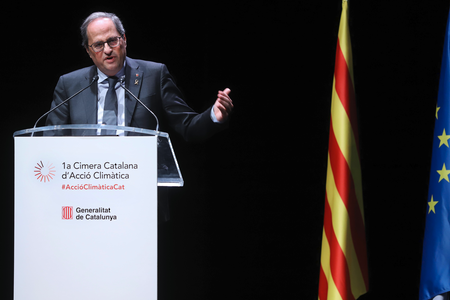- The head of the executive presided over the Catalan Climate Action Summit this morning
- Minister Calvet said the key question is not how much it will cost to make changes, but “how much doing nothing will cost us”

The president of the Government of Catalonia, Quim Torra, said today that tackling climate change is “one of our key priorities” and “a challenge for all of us – for the Catalan government, city councils, public institutions, companies, and economic, social and professional organisations”.
The head of the executive made these remarks in his closing statement at the Catalan Climate Action Summit, held this morning at the National Theatre of Catalonia, which was also attended by the Minister for Territory and Sustainability, Damià Calvet. The Summit served as a meeting point to agree a short- and medium-term road map for tackling the climate emergency based on concrete commitments by civil society and socio-economic actors as well as the Catalan government. The meeting is one of the measures that was approved by the Executive Council when it declared a climate emergency. The Catalan government’s declaration recognises the serious risk posed by global warming, the need to make significant changes to the current socio-economic model, and the urgent need to adopt critical decisions and take effective action within the next decade.
President Torra said the Catalan government is pursuing policies to address the climate emergency despite “not having as much decision-making power in this area as the governments of Scotland and California”. The head of the executive said it was therefore important to “work for the independence of Catalonia, because it’s also a way to ensure that we have all the tools we need to create a better country for our sons and daughters”.
Torra also talked about some of the initiatives being pursued. In addition to the government’s declaration of a climate emergency, these include the creation of a new public health response programme, a low-emission zone in Barcelona, and a CO2 tax on vehicles that will generate €150 million for a climate fund to help cover the cost of actions in this area.
The Minister for Territory and Sustainability, Damià Calvet, said: “Some of you may be wondering how much these changes are going to cost us, but the real question we should be asking is how much doing nothing will cost us”. According to the minister, “with obsolete infrastructure or production processes, the cost is likely to be much higher”. Calvet said: “We will continue to look to Europe, and we’ll be keeping a close eye on the European Green Deal, which proposes to allocate 25% of the total budget for its programmes to actions related to climate change. We want the same for Catalonia.” The minister concluded: “Rapid, committed action is the path we need to follow, and today Catalonia is moving on to the action phase.”
223 individuals, 191 organisations, 21 sectors
A number of meetings with representatives of various economic and social sectors have been held since December with the aim of engaging institutions, organisations and civil society. A total of 223 individuals representing 191 companies, organisations and institutions in 21 sectors have participated in this process. All of them have been urged to join initiatives that contribute to a more rapid, fair and effective transition to a climate-neutral economy.
Quantitative targets and a calendar for implementation
Organisations that sign the Summit pledge will commit to the goal of making Catalonia carbon-neutral by 2050. The signatories undertake to publicly present, within one year, a road map with quantitative targets and a calendar for reducing their emissions. Other general commitments include a focus on driving forward the energy transition and boosting the circular economy.
A series of concrete actions are also proposed to reduce emissions in 11 sectors and areas: local administration; socio-economic organisation; town planning, architecture and construction; the environmental and energy sector; the financial sector; mobility, public transport and logistics; trade, tourism and services; the industrial and digital sector; the primary sector; higher education and research; and the health sector.
Minister Calvet concluded: “We’ve made some progress, but now we need to take the huge step it will take to change the way we live.”